FILE - Skulls of some of those who were slaughtered as they sought refuge in the church sit in glass cases, kept as a memorial to the thousands who were killed in and around the Catholic church during the 1994 genocide, in Ntarama, Rwanda, on April 5, 2019. A frail 87-year-old Rwandan, Félicien Kabuga, accused of encouraging and bankrolling the 1994 genocide in his home country goes on trial Thursday, Sept. 29, 2022, at a United Nations tribunal, nearly three decades after the 100-day massacre that left 800,000 dead. (AP Photo/Ben Curtis, File)
The Associated Press
THE HAGUE, Netherlands (AP) - A frail 87-year-old Rwandan accused of encouraging and bankrolling the country's 1994 genocide refused to attend the opening of his trial at a United Nations tribunal Thursday, nearly three decades after the 100-day massacre left 800,000 dead.
Félicien Kabuga is one of the last fugitives charged over the genocide to face justice and, even without him in court, the start of his trial marks a key day of reckoning for Rwandans who survived the killings or whose families were murdered.
He did not appear in court amid a dispute over his legal representation but Presiding Judge Iain Bonomy said the case could open without Kabuga.
The mass killing of Rwanda's Tutsi minority was triggered on April 6, 1994, when a plane carrying President Juvénal Habyarimana was shot down and crashed in the capital, Kigali, killing the leader who, like the majority of Rwandans, was an ethnic Hutu. Kabuga's daughter married Habyarimana's son.
The Tutsi minority was blamed for downing the plane. Bands of Hutu extremists began slaughtering Tutsis and their perceived supporters, with help from the army, police, and militias.
In his opening statement, prosecution lawyer Rashid Rashid described Kabuga as an enthusiastic supporter of the slaughter who armed, trained and encouraged murderous Hutu militias known as Interahamwe.
Rashid said the trial was opening nearly three decades after the genocide because of Kabuga's determined efforts to evade capture.
In Rwanda, Naphtal Ahishakiye, the executive secretary of a genocide survivors' group known as Ibuka, said it's never too late for justice to be delivered.
'œEven with money and protection, one cannot escape a genocide crime,'ť Ahishakiye said in Rwanda ahead of Thursday's trial at the International Residual Mechanism for Criminal Tribunals in The Hague.
Kabuga's 15-page indictment alleges that, as a wealthy businessman with close links to the Hutu political elite, he incited genocide through the RTLM broadcaster he helped fund and establish. In some cases, it provided locations of Tutsis so they could be hunted down and killed, according to the indictment.
He's also accused of having paid for weapons, including machetes, used by militias to slaughter Tutsis and their perceived supporters.
Kabuga 'œdid not need to wield a rifle or a machete at a roadblock, rather he supplied weapons in bulk and facilitated training that prepared the Interahamwe to use them,'ť Rashid said.
'œHe did not need to pick up a microphone and call for extermination of Tutsi ... rather he founded, funded and served as president of Radio Télévision Libre des Mille Collines (RTLM), the radio station that broadcast genocidal propaganda across Rwanda.'ť
Rashid called the broadcaster a 'œmouthpiece for anti-Tutsi propaganda" and said Kabuga's trial was about holding him accountable for his 'œsubstantial and intentional contribution to ... genocide.'ť
'œRTLM broadcasts glorified this violence, celebrating killings, praising killers and encouraging perpetrators to continue the violence at roadblocks and other locations,'ť Kabuga's indictment says.
Kabuga is charged with genocide, incitement to commit genocide, conspiracy to commit genocide as well as persecution, extermination and murder. He has pleaded not guilty. If convicted he faces a maximum sentence of life imprisonment.
After years of evading international efforts to track him down, Kabuga, who had a $5 million bounty on his head, was arrested near Paris in May 2020. He was transferred to The Hague to stand trial at the residual mechanism, a court that deals with remaining cases from the now-closed U.N. tribunals for Rwanda and the Balkan wars.
Kabuga's lawyers argued unsuccessfully that he was not fit to stand trial. However, on the advice of doctors who examined Kabuga, the process will run for just two hours per day. The first evidence in the case is expected to be heard next week.
Yolande Mukakasana, a genocide survivor and writer who lost her entire family in the genocide, said the case has come too late for many survivors who have died since the slaughter.
'œMen and women of Kabuga's age were found in bed and murdered. Shame (upon) his sympathizers who cite his old age as a reason not to (stand) trial," she said.
Genocide survivor Justin Rugabwa told The AP that five members of his family escaped into hiding for several days during the genocide until Kabuga's radio station revealed their whereabouts.
'œWhen their names were read out on radio and hiding places revealed, the militias came and all died that day,'ť Rugabwa recalled.
____
Ignatius Ssuuna in Kigali, Rwanda, contributed.
FILE - The skulls and bones of some of those who were slaughtered as they sought refuge inside the church are laid out as a memorial to the thousands who were killed in and around the Catholic church during the 1994 genocide in Ntarama, April 4, 2014. ,A frail 87-year-old Rwandan, Félicien Kabuga, accused of encouraging and bankrolling the 1994 genocide in his home country goes on trial Thursday, Sept. 29, 2022, at a United Nations tribunal, nearly three decades after the 100-day massacre that left 800,000 dead.(AP Photo/Ben Curtis, File)
The Associated Press
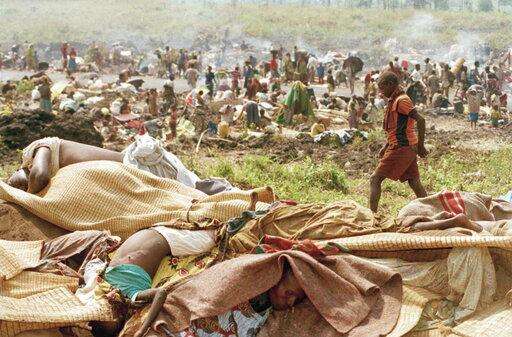
EDS NOTE: GRAPHIC CONTENT - FILE - A Rwandan Hutu refugee walks past bodies of his countrymen at the Munigi refugee camp outside Goma, Democratic Republic of Congo, then known as Zaire, on July 25, 1994. A frail 87-year-old Rwandan, Félicien Kabuga, accused of encouraging and bankrolling the 1994 genocide in his home country goes on trial Thursday, Sept. 29, 2022, at a United Nations tribunal, nearly three decades after the 100-day massacre that left 800,000 dead. (AP Photo/Jockel Finck, File)
The Associated Press
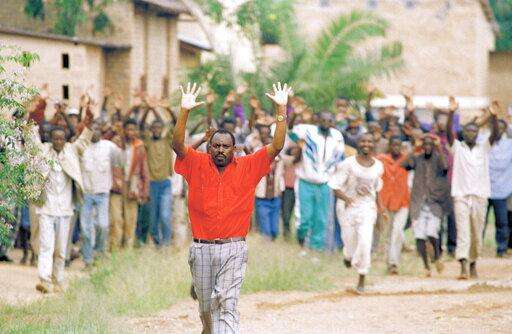
FILE - Rwandan refugees hold their hands up and ask for help from Belgian soldiers, who had come to a psychiatric hospital compound outside of Kigali on April 13, 1994. A frail 87-year-old Rwandan, Félicien Kabuga, accused of encouraging and bankrolling the 1994 genocide in his home country goes on trial Thursday, Sept. 29, 2022, at a United Nations tribunal, nearly three decades after the 100-day massacre that left 800,000 dead. (AP Photo/Karsten Thielker, File)
The Associated Press
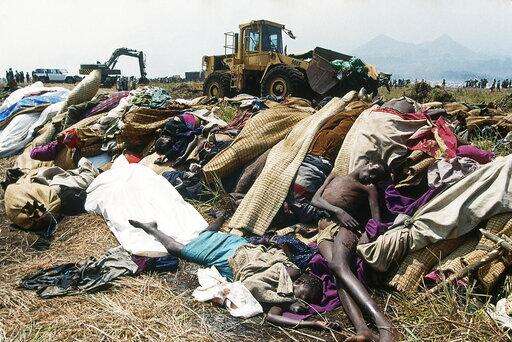
EDS NOTE: GRAPHIC CONTENT - FILE - A bulldozer operated by a French soldier shovels bodies into a mass grave at the Kibumba camp near Goma, Democratic Republic of Congo, then known as Zaire, on July 31, 1994. A frail 87-year-old Rwandan, Félicien Kabuga, accused of encouraging and bankrolling the 1994 genocide in his home country goes on trial Thursday, Sept. 29, 2022, at a United Nations tribunal, nearly three decades after the 100-day massacre that left 800,000 dead. (AP Photo/Michel Euler, File)
The Associated Press
FILE - Thousands of Rwandan refugees wait to get food at the Mugunga camp near Goma, Democratic Republic of Congo, then known as Zaire, on July 27, 1994. A frail 87-year-old Rwandan, Félicien Kabuga, accused of encouraging and bankrolling the 1994 genocide in his home country goes on trial Thursday, Sept. 29, 2022, at a United Nations tribunal, nearly three decades after the 100-day massacre that left 800,000 dead. (AP Photo/Javier Bauluz, File)
The Associated Press
FILE - A young Tutsi refugee gazes upon the Tutsi camp of Nyarushishi, on August 25, 1994, 6 miles southeast of Cyangugu, Rwanda. A frail 87-year-old Rwandan, Félicien Kabuga, accused of encouraging and bankrolling the 1994 genocide in his home country goes on trial Thursday, Sept. 29, 2022, at a United Nations tribunal, nearly three decades after the 100-day massacre that left 800,000 dead. (AP Photo/Jean-March Bouju, File)
The Associated Press
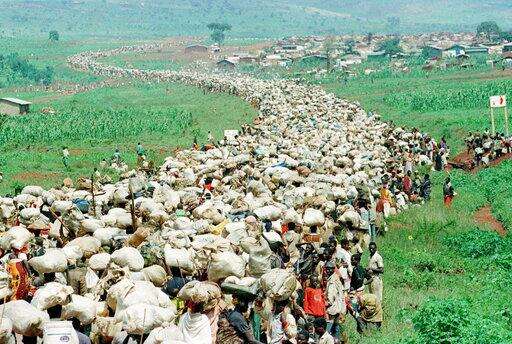
FILE - Tens of thousands of Rwandan refugees, who have been forced by Tanzanian authorities to return to their country despite fears they will be killed upon their return, stream back towards the Rwandan border on a road in Tanzania, on Dec. 19, 1996. A frail 87-year-old Rwandan, Félicien Kabuga, accused of encouraging and bankrolling the 1994 genocide in his home country goes on trial Thursday, Sept. 29, 2022, at a United Nations tribunal, nearly three decades after the 100-day massacre that left 800,000 dead. (AP Photo/Jean-Marc Bouju, File)
The Associated Press
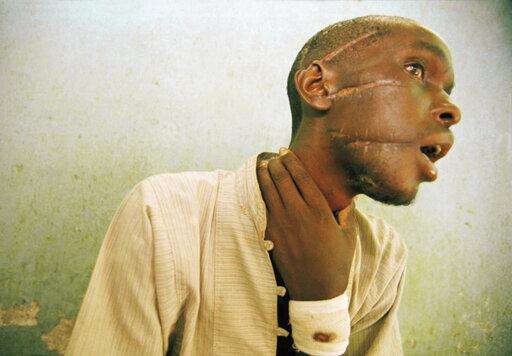
FILE - Nyabimana (first name unknown), 26, shows machete wounds at an International Committee of the Red Cross Hospital in Nyanza, some 35 miles southwest of Kigali, Rwanda, on June 4, 1994. A frail 87-year-old Rwandan, Félicien Kabuga, accused of encouraging and bankrolling the 1994 genocide in his home country goes on trial Thursday, Sept. 29, 2022, at a United Nations tribunal, nearly three decades after the 100-day massacre that left 800,000 dead. (AP Photo/Jean-Marc Bouju, File)
The Associated Press
Felicien Kabuga's defence lawyer Emmanuel Altit, left, speaks with prosecutor Rupert Elderkin in court at the UN International Residual Mechanism for Criminal Tribunals (IRMCT) in The Hague, Thursday, Sept. 29 2022. Kabuga, who is accused of encouraging and bankrolling the country's 1994 genocide, goes on trial at a United Nations tribunal Thursday, nearly three decades after the 100-day massacre left 800,000 dead. (Koen van Weel/Pool Photo via AP)
The Associated Press
Prosecutors Rashid Salim Rashid, left, and Rupert Elderkin in court at the UN International Residual Mechanism for Criminal Tribunals (IRMCT) in The Hague, Thursday, Sept. 29 2022. Felicien Kabuga, who is accused of encouraging and bankrolling the country's 1994 genocide, goes on trial at a United Nations tribunal Thursday, nearly three decades after the 100-day massacre left 800,000 dead. (Koen van Weel/Pool Photo via AP)
The Associated Press